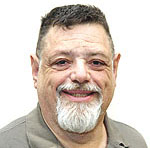‘I’ ON CULTURE
The new catchphrase in the news these day is “fake news.” Many media stars warn against it. But, unfortunately, it does not always mean “news that has not happened” but often news that the media folk, of one political stripe or another, do not want you to know. And it is done by all sides, taking many forms.
One example of this was the recent focus on the Electoral College. News people spent countless minutes (and in the case of the cable news stations, hours) discussing how Donald Trump might be overthrown there. Talking heads discussed how it might be done. Celebrities led a social media charge begging and even threatening Republican electors.
These people never mentioned that only once in American history has more than one elector turned away from their pledged candidate. As a result, many people were shocked when Clinton actually lost five votes while Trump lost two. By the way, just about no one brought up the possibility that Clinton could lose votes and certainly did not point out that in some states it was not possible to even do so. She would have lost several more votes if a few rebel electors had not been tossed out.
And we eventually heard the line that she “lost more votes than any candidate since 1872,” without an explanation of that election. For those who hated social studies, Ulysses S. Grant was running for re-election as a Republican. A group of reform Republicans nominated Horace Greeley as a third-party candidate, but then the Democrats also nominated him. Grant won easily. But Greeley died in between the election and the meeting of the Electoral College, so his electoral votes were scattered. In other words, it was a very rare situation, and there was no real change in the outcome of the election. But the media fanned the flames to get more interest.
Both sides pushed fake news during the election. Conservative sources made it seem like Clinton was one step from death. Any time one of her staff touched her, it was to “steady the clearly very ill candidate.” On the liberal side, sources connected a small fringe, neo-Nazi group (they actually scream “heil Hitler” at their tiny rallies) with a source like Breitbart.com, a pro-Israel conservative site run by Orthodox Jews. Why was all of this done? Well, what better way to mess up the Democrats than to portray the lead candidate as being on her last legs, and combining two groups that are natural enemies smears a key Trump adviser and plays well with liberals?
The problem with trying to define what is fake is that it depends on what political beliefs you have. In Germany right now, the government is concerned that its immigration policy and the increase in crime that has accompanied it could lead to “manipulation of the people.” In other words, people might get really ticked off if someone they knew was attacked. So they are now working to make certain that only the news that the government believes is true can be heard.
We have the same problem in this country. Keep in mind that most of the news is pretty straightforward. People generally do not try to play these games with local news. But on the national front, there is concern. Facebook has selected groups to flag “fake news.” But the censors are all from one side of the debate. And Facebook, along with Twitter, is already being sued by the families of victims of the Pulse attack in Orlando for allowing terrorists to organize using their media operations. It will be very difficult to defend against similar lawsuits if it can be shown these companies are not merely conduits for everything but have chosen to limit at least some points of view.
How do you avoid being taken in? The best way is to use the internet to check sources from all sides. I read stories from the far left ranging to the far right. I can easily dismiss many of them. But in some cases, there are links to more objective sources that help me make decisions. I do not claim omniscience; I was surprised at the election results this year. But not as surprised as the “experts” on television. Sources on both the right and left were presenting warning signs. Read and learn and, as a former president once said, “Trust but verify.”






